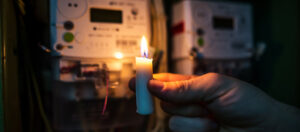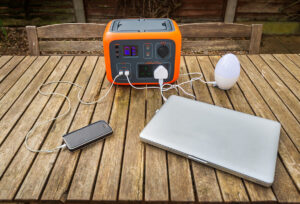Rolling blackouts, cars hitting transformers, hurricanes; there are numerous causes for power outages. What they have in common is that you’ll have company in your misery because, aside from the non-payment of the power bill, they typically don’t affect just one home.
How long you’ll be without power depends on the original problem, where you live, and a few other factors. When you’ve been without power for an hour or more, the answer to the “how long?” question may seem like an eternity.
A power outage, if it lasts long enough, can impact you in several ways, including finances and safety.
A power outage can hit you in the bank account
The financial impact of a medium-to-long-term power outage shouldn’t be underestimated and should be planned for. What will you do if you’re facing:
- The lack of air-conditioning, heat, safe running water, and a working toilet?
- An inoperable refrigerator/freezer full of perishable food?
- An inoperable home security system?
- Transportation and shelter expenses if you need to leave your home?
Power outages can be quite dangerous
When indoor temperatures drop during a winter power outage, they typically do so rapidly. “This can increase the risk of freezing pipes which can cause them to crack and burst,” cautions Ben Suiskind, CEO of All Dry USA.
Outages can also cause food to spoil and water contamination.
Finally, a power outage can be catastrophic to those who are dependent on medical equipment that runs on electricity.
Some thoughts about planning
Having a plan in place can help ease the danger and discomfort of a power outage. An emergency savings account will help with any related financial expenses. Disaster preparedness experts offer up a number of tips, depending on how long the disaster is expected to last.
For instance, “The refrigerator will keep food cold for about 4 hours if it is unopened. A full freezer will keep the temperature for approximately 48 hours (24 hours if it is half full) if the door remains closed,” according to the pros at FDA.gov.
Additional preparations for a short-term loss of power might include:
- Purchase a home generator.
- Freeze large plastic bottles of water and keep them in the freezer to help keep the temperature down when the power goes out.
- Compile an emergency kit that includes flashlights or LED lights, batteries, a first-aid kit, water and non-perishable food, and a battery or crank-powered radio. Don’t forget pet items. Experts recommend that you keep these items in backpacks in case you need to ‘bug out.’
- Make a family/friends emergency plan that details where you will all meet up during an emergency and each person’s contact information. Designate a person and a backup person who is charged with picking up young children from school.
Be safe
- Don’t use a gas stove, oven, camping stove, charcoal grill or anything similar to heat your home. These items, used indoors, can cause carbon monoxide poisoning.
- Generators are handy, but use them outdoors and keep them away from the home’s windows.
- Disconnect appliances and electronics (computers, TVs, etc.) to avoid damage from electrical surges. When the power returns, plug these items back in, one at a time.
- When the power returns, “Throw away any food that has been exposed to temperatures 40 degrees or higher for two hours or more, or that has an unusual odor, color or texture,” caution the experts at Ready.gov.
Find more tips and ideas online at the Federal Emergency Management Agency (FEMA) website.








